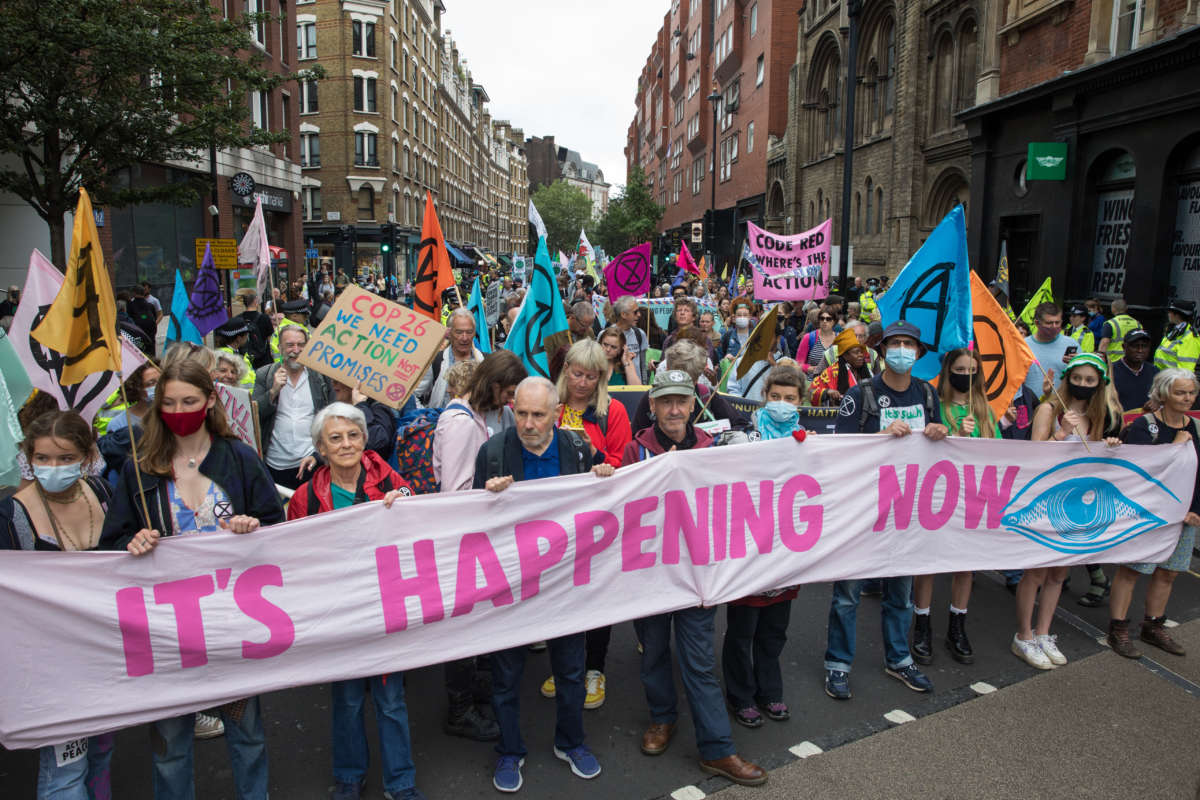Did you know that Truthout is a nonprofit and independently funded by readers like you? If you value what we do, please support our work with a donation.
Bolstering the case for meaningful climate action, a major report released Wednesday found that Earth’s atmospheric greenhouse gas concentrations and sea levels both hit record highs in 2020.
Based on the contributions of more than 530 scientists from over 60 countries and compiled by the U.S. National Oceanic and Atmospheric Administration (NOAA), State of the Climate in 2020 is the 31st installment of the leading annual evaluation of the global climate system.
“The major indicators of climate change,” officials from NOAA’s National Centers for Environmental Information pointed out in a statement, “continued to reflect trends consistent with a warming planet. Several markers such as sea level, ocean heat content, and permafrost once again broke records set just one year prior.”
“Annual global surface temperatures were 0.97°–1.12°F (0.54°–0.62°C) above the 1981–2010 average” in 2020, said NOAA, making last year one of the three warmest on record “even with a cooling La Niña influence in the second half of the year.”
Last year was the warmest on record without an El Niño effect, and “new high-temperature records were set across the globe,” NOAA said. The agency added that the past seven years (2014-2020) had been the seven warmest on record.
Although the coronavirus-driven economic slowdown resulted in an estimated 6% to 7% reduction of carbon dioxide (CO2) emissions in 2020, the global average atmospheric concentration of CO2 increased to a record high of 412.5 parts per million. The atmospheric concentrations of other major greenhouse gases (GHG), including methane and nitrous oxide, also continued to climb to record highs last year despite the pandemic.
According to NOAA, last year’s CO2 concentration “was 2.5 parts per million greater than 2019 amounts and was the highest in the modern 62-year measurement record and in ice core records dating back as far as 800,000 years.” Moreover, “the year-over-year increase of methane (14.8 parts per billion) was the highest such increase since systematic measurements began.”
In addition, global sea levels continued to rise, surpassing previous records.
“For the ninth consecutive year,” said NOAA, “global average sea level rose to a new record high and was about 3.6 inches (91.3 millimeters) higher than the 1993 average,” which is when satellite measurements began. As a result of melting glaciers and ice sheets, warming oceans, and other expressions of the climate crisis, the “global sea level is rising at an average rate of 1.2 inches (3.0 centimeter) per decade.”
Other notable findings of the new report include:
- Upper atmospheric temperatures were record or near-record setting;
- Oceans absorbed a record amount of CO2, global upper ocean heat content reached a record high, and the global average sea surface temperature was the third highest on record;
- The Arctic continued to warm at a faster pace than lower latitudes — resulting in a spike in carbon-releasing fires — and minimum sea ice extent was the second smallest in the 42-year satellite record;
- Antarctica witnessed extreme heat and a record-long ozone hole; and
- There were 102 named tropical storms during the Northern and Southern Hemisphere storm seasons, well above the 1981–2010 average of 85.
In contrast to the release less than three weeks ago of the latest assessment from the United Nations’ Intergovernmental Panel on Climate Change, which warned that fossil fuel emissions are intensifying extreme weather disasters — provoking a flurry of reactions and even garnering a short-lived uptick in corporate media’s coverage of the climate emergency — NOAA’s new report was met with less fanfare.
In one of the few early statements issued by members of Congress in response to the report, Rep. Eddie Bernice Johnson (D-Texas) said that “scientists sounded the alarm on the climate crisis again.”
“It is clear that without swift action, we can, unfortunately, expect to set new records like these every year,” said Johnson, chair of the House Committee on Science, Space, and Technology. “The consequences of climate change impact every American — especially disadvantaged communities — across the country; from the devastating floods in Tennessee a few days ago to the record-breaking wildfires in the West.”
“Building a better future for all means acting on climate now,” the lawmaker added. “This situation is urgent, but it’s not hopeless. We have an opportunity to lead the global response in the fight against the climate crisis — we cannot afford to waste it.”
Press freedom is under attack
As Trump cracks down on political speech, independent media is increasingly necessary.
Truthout produces reporting you won’t see in the mainstream: journalism from the frontlines of global conflict, interviews with grassroots movement leaders, high-quality legal analysis and more.
Our work is possible thanks to reader support. Help Truthout catalyze change and social justice — make a tax-deductible monthly or one-time donation today.
